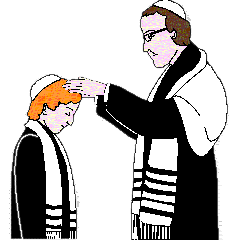CHANGE OF THE ORIGINAL INTENTION?


CHANGE OF THE ORIGINAL INTENTION?

Shalom,
This time we would like to focus on two examples where the verses/laws described in the Torah are supposedly “altered” in certain circumstances…
1. The Odd Gift of Mezuzah
The mitzvah of mezuzah – מזוזה , is found in this week’s Torah portion עקב – EKEV.
וְהָיוּ הַדְּבָרִים הָאֵלֶּה, אֲשֶׁר אָנֹכִי מְצַוְּךָ הַיּוֹם–עַל-לְבָבֶךָ
וּכְתַבְתָּם עַל-מְזֻזוֹת בֵּיתֶךָ, וּבִשְׁעָרֶיךָ
And these words, which I command thee this day, shall be upon thy heart…
And thou shalt write them upon the door-posts of thy house, and upon thy gates. (Deuteronomy 6:6,9)


The word מזוזה – mezuzah actually means door post, but in this context it relates to a scroll (a portion of the Torah) usually inserted in a small case and placed in the upper portion of the right door-post.
The Talmud tells a story about Rabbi Yehuda Hanasi who once sent a mezuzah as a gift to Artaban, king of Persia, explaining that the small scroll would protect him from harm.
Rabbi Yehuda Hanasi’s gesture seems odd.
The commandment to affix a mezuzah upon one’s doorposts, as stated in the Torah was supposedly given only to the Jewish nation.
Question 1:
Why did Rabbi Yehuda Hanasi promise the gentile king that the mezuzah would guard and protect him, if this mitzvah was given only to the people if Israel?
It is interesting to point that during the time of the Mishnah there existed a common practice of inserting a mezuzah scroll into one’s walking stick, also done for the sake of the protection.
Question 2:
A walking stick is certainly not included in the commandment of mezuzah as told by the Torah.
How, then, did the mezuzah offer protection being inserted in a walking stick?
Well, one must make a distinction between the reward a person receives for performing a mitzvah and the intrinsic attribute of the mitzvah itself.
When a person obeys G-d’s command by fulfilling a mitzvah, the reward he earns is a separate and distinct entity, additional to the essential nature of the mitzvah.
For example, the Torah states that the reward for the mitzvah of mezuzah is long life: “That your days be increased and the days of your children.”
Our Sages explained that when a kosher mezuzah is affixed to the door post, G-d Himself watches over the occupants of the house, even when they are not at home. A mezuzah is written solely for the purpose of protection, and, by its nature, it protects.
So, regardless of its usage setup, or of those who use it, a mezuzah still possesses the attribute of protection.
It was for this reason that Rabbi Yehuda Hanasi sent the mezuzah as a gift to the Persian king and that Jews took mezuzot with them inside their walking sticks wherever they went.
2. Odd Vowels of a Word
In this week’s Torah portion there is the following verse:
וְהֵסִיר יְהוָה מִמְּךָ, כָּל-חֹלִי; וְכָל-מַדְוֵי מִצְרַיִם הָרָעִים אֲשֶׁר יָדַעְתָּ, לֹא יְשִׂימָם בָּךְ, וּנְתָנָם, בְּכָל-שֹׂנְאֶיךָ
And the LORD will take away from thee all sickness; and He will put none of the evil diseases of Egypt, which thou knowest, upon thee, but will lay them upon all them that hate thee. (Deuteronomy 7: 17)
A story is told about a person who came to Rabbi Ariyeh of Radzimin and told him about his numerous and severe ailments.
He started crying and said that he did not have money to pay for the treatments and medication.
The rabbi blessed him.

He used the following words from the above verse:
pronounced ‘MI’MKHA’ – from you וְהֵסִיר יְהוָה מִמְּךָ
כָּל-חֹלִי
And the LORD will take away from you all sickness;
But the rabbi pronounced it a bit differently using alternate vowels – Nekudot (dots) for the same word מִמְּךָ
pronounced ‘MI’MAKH’ – from the poor וְהֵסִיר יְהוָה מִמָּךְ
כָּל-חֹלִי
Then the meaning of this verse becomes:
And the LORD will take away from the poor all sickness;
מָך – MAKH = Poor
The rabbi added:
‘For the sake of the poor it is allowed to “change” a few “dots” in the Torah…
(Hebrew vowels are called ‘dots’)
Wishing you protection and good health.
Shabbat shalom,
.
Yoel & Orly

Planning to spend the holidays in Israel?
Don’t miss our H2 immersion courses and outdoor activities!
The ‘Holiday Hebrew’ (aka H2) course is a three-day immersion experience in which you will have an opportunity to both learn Hebrew and enjoy the Holiday atmosphere in Israel.
So if you are in Israel anytime between September 27 and October 22nd, don’t settle for anything other than making
Hebrew a part of your Israel experience!
For details please contact us at:
https://www.ulpanor.com/contact/
Many ask us for a permission to redistribute our newsletters. By all means, please do feel free to forward this newsletter to anyone you wish!
Access the archive of our previous posts at:
https://www.ulpanor.com/category/blog/
Subscribe to our newsletters on our website at the bottom of the home page:




